The Cooler Master MasterCase 5 Review
by E. Fylladitakis on August 27, 2015 9:00 AM EST- Posted in
- Cases/Cooling/PSUs
- Cooler Master
- mid-tower
- Case
- Freeform
Test Setup
Professional testing requires the emulation of real-world situations but with repeatable results; thus, a perfectly controllable test setup and environment are required, especially for comparable results. Testing the thermal performance of any case with a typical real-world setup technically limits the comparability of the results to this setup alone, as an active system interacts with its environment and the change of a single component would alter myriads of variables. As such, we developed synthetic loads that emulate the thermal output of real systems, which however are passive, steady and quantifiable. As such, the thermal testing now displays the thermal capabilities of the case alone, as if it would have to deal with the entire thermal load by itself, regardless of the system that would be installed inside it. Laboratory data loggers are being used to monitor the PT100 sensors and control the safety relays, which are fully accessible via our custom software. Three such loads have been developed; the ATX version simulates a 200W CPU, 50W VRM, 30W RAM and 4 × 120W GPU card thermal load. Finally, three 3.5" HDD dummy loads have also been created, with each of them converting 30 W of electrical power to thermal, bringing the total thermal load of the ATX test setup up to 850 Watts. As such, the thermal load is immense and only the best of cases will be able to handle it for more than a few minutes, we are also performing a test with a thermal load of 400W, with all of the aforementioned components except the HDD drives at about 42% power, which is more suitable for the majority of cases.
Thermal testing has been performed with all of the case's stock fan operating at maximum speed. Noise testing has been performed with a background noise level of 30.4dB(A). Advanced noise testing is also being performed, in order to assess the ability of the case to dampen the noise of the components installed inside it. This includes the installation of two noise-generating sources (strong fans) inside the case, one positioned approximately over the first expansion slot and one over the CPU area, which generate ≈ 44.2 dB(A) when unobstructed. During the advanced noise test, all stock cooling options of the case are entirely disabled.
Results and Discussion
Taking into account the size and design of the MasterCase 5, we anticipated that it would perform about as well as any good Midi-ATX tower. Its primary sales point, the modular design, is not something that could directly affect thermal performance. Still, it is a well-ventilated case and thus it is not lacking in comparison with the competition, offering similar thermal performance as other high performance designs. It falls just a little behind the Phanteks Enthoo Pro, a case that has about the same volume as the MasterCase 5. Both the Corsair 450D and the SilverStone Fortress FT05 outperform the MasterCase 5 by a few degrees, but both of these cases come with superior stock cooling solutions as well.
The two stock cooling fans of the Cooler Master MasterCase 5 are deceptively loud for their size and type. They are not ear bursting but we expected to see lower sound pressure figures than these. This is not entirely due to bad quality or overly powerful fans however. A large portion of the noise comes from the aerodynamic drag caused by the vents and case components. In other words, the air moved by the fans through the grills/vents is causing the high sound pressure levels. When the speed of the fans is halved, where the air pressure is very low, there is virtually no audible sound at all.
The lack of sound dampening capabilities enhances this problem. With so many openings and vents, the MasterCase 5 is unable to significantly dampen any noise source inside of it. Although the fan's noise tests hinted this, our second test using the dummy test source verified it. The MasterCase 5 reduced the sound pressure generated by our dummy noise source by just 1.3 dB(A), from 44.2 dB(A) to 42.9 dB(A). This is a very small and indiscernible difference for a human ear.


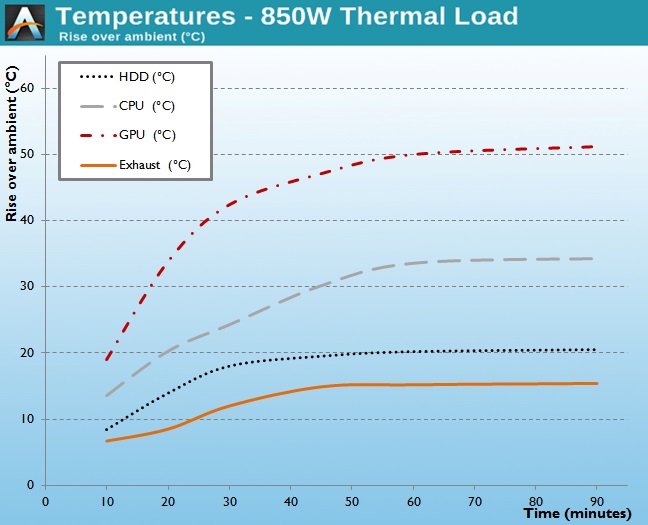
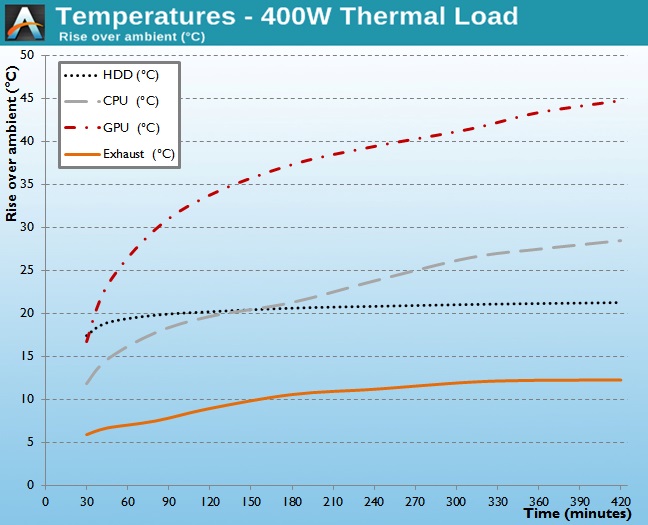
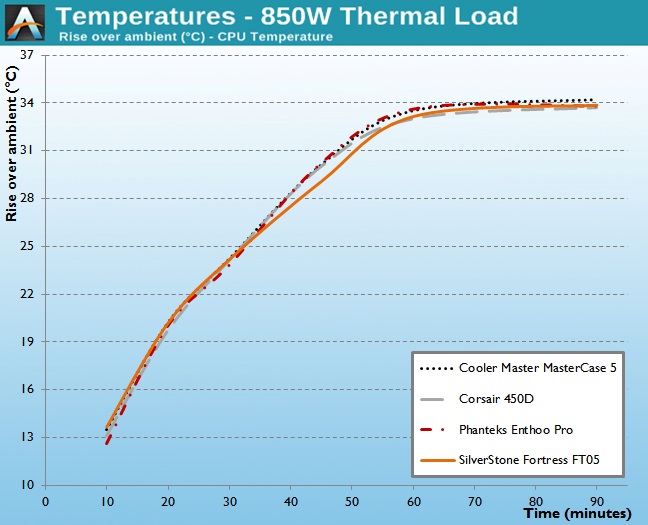
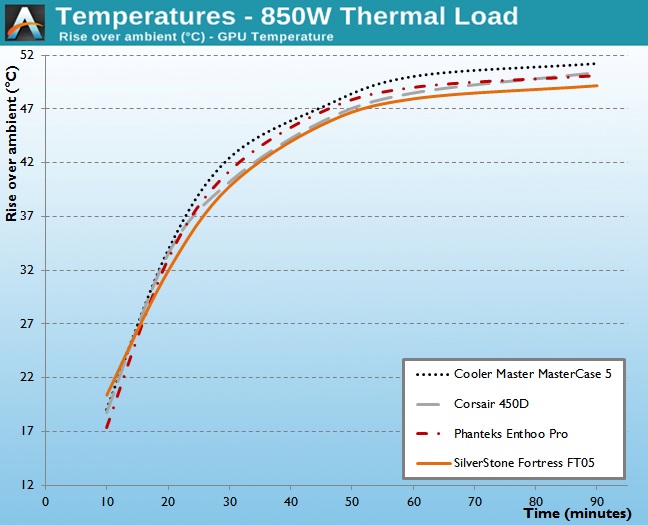
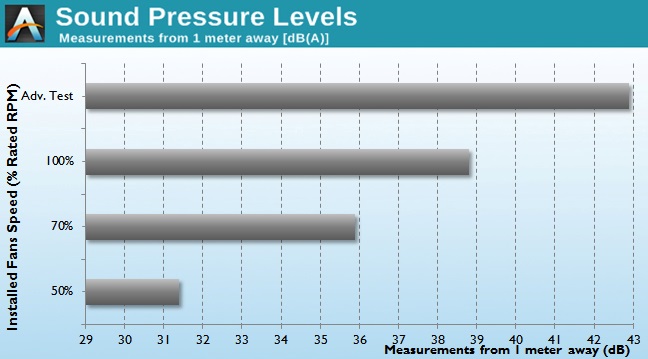








32 Comments
View All Comments
Terry Suave - Thursday, August 27, 2015 - link
It would seem to me that Fractal Design is a better choice over this half-baked attempt at modularity. Even the Define R4 allows both a front radiator + HDD cages at the same time, and the R5 has even more quality of life improvements.Achaios - Thursday, August 27, 2015 - link
I have to agree with Terry Suave.What is actually happening in the market of PC Cases, is Swedish Fractal Design taking the PC entusiast world by storm.
The Fractal Design S & R5 have been reviewed by every single major You Tube PC Enthusiast reviewer, including Jayz Two Cents, Linus Tech Tips, Paul's Hardware as well as the British Kit Guru.Net, and have received dithyrambic praise by ever single reviewer.
From what I see of this case, it offers nothing to the PC enthusiast that Fractal Design S doesn't have and there are even several features that are missing.
All in all, I am quite disappointed. I am a Cooler Master fan btw, having owned a Cooler Master Cosmos RC-1000 case. It is very disappointing to see Cooler Master fail to study the Fractal Design S and produce a similar case.
In my humble opinion, there isn't any reason for an enthusiast to buy anything other than a Fractal Design S or R5 at this stage. Personally, I was forced to buy a Corsair Graphite 780T to replace my former Cooler Master COSMOS RC-1000, but this only because Fractal Design cases are sold out everywhere here in Greece. Generally, I dislike Corsair and tend to avoid them as a company that sells over-priced medium to low-quality hardware.
usernametaken76 - Thursday, August 27, 2015 - link
"The Fractal Design S & R5 have been reviewed by every single major You Tube PC Enthusiast reviewer, including Jayz Two Cents, Linus Tech Tips, Paul's Hardware as well as the British Kit Guru.Net, and have received dithyrambic praise by ever single reviewer."Some or all of them do advertising for Fractal Design. They're also YouTube reviewers, high on production value (in some cases) while light on critical details. Not always, sometimes they give the specific reasons for why they feel something could use improvement, but all in all, those YouTube reviewers you mentioned are fluff.
Achaios - Thursday, August 27, 2015 - link
While it is true that some of them do advertising in the form of spots inserted into their videos or product presentation, I wouldn't call any of these reviews as fluff. In addition, it is somewhat condescending & baseless to assume that every viewer of the said channels cannot discern said reviewers heavily and disingenuously pushing a specific product.It is no coincidence that every single reviewer is of the same opinion regarding Fractal Design cases.
As a final note, Kit Guru. Net (Brits) have been specifically excluded by AMD in their latest GPU presentation due to their refusal to compromise on delivering impartial reviews, so you are misinformed in addition to being wrong.
usernametaken76 - Thursday, August 27, 2015 - link
I would and did. They are light on details and anytime you accept advertising and free products from the company you're reviewing, it's 100% suspect that you're able to provide an unbiased viewpoint. Those guys have to make a living, I don't fault them for that. But many, many videos they put out start out strong and ride off with a whimper. Almost as if they said what they needed to say before getting to the final bits of advertising (some of which consume 20-30% of the total runtime of said videos. I don't take them seriously. They do provide a service but, for the most part, it's all just entertainment. They are entertaining. When I want to make an informed decision I read Ars and Anand and pcper, HardOCP, bit-tech, etc.usernametaken76 - Thursday, August 27, 2015 - link
p.s. you could just as well be a shill for Fractal Design. There's no way for anyone to know.As far as Kit Guru, one example. If they (AMD) have limited supply, and believe Kit Guru or anyone else may be shilling for Nvidia or anyone else, that's their call to supply or not supply them with free review hardware. If Kit Guru wanted to or did purchase retail product for review, that's their prerogative.
As far as being wrong and uninformed, that's your opinion. You're generalizing based on me disagreeing with you, and I don't care if you agree with me or not.
My opinion is those YouTube channels are providing a service, an entertaining one, but they are too short and do not provide enough "meat" for me to make an informed decision. Almost never do that do that, and if they are pushing Fractal Design products AT THE BEGINNING of their video, I'm going to judge them based on what they are...paid endorsers.
Isambard - Thursday, August 27, 2015 - link
Kitguru? You mean the same site who just copied their PSU testing equipment from another website and are claiming to be doing tests impossible to be done? The same site that continuously posts odd ripple and single digit numbers with a 12bit usb oscilloscope with a maximum resolution of 10mv that can show only even numbers? Those who are making new posts based on what they overheard from company members sitting next their table at a cafe?Please. Everyone who knows a thing or two about computers and electronics knows that this site is a sham. They have done so many amateurish mistakes betraying most of their reviews and articles are fake that it is obvious they are not even at a level allowing them to cheat properly.
Samus - Friday, August 28, 2015 - link
O SNAPJonnyDough - Tuesday, September 22, 2015 - link
*snaps 7 fingers on both handsromrunning - Thursday, August 27, 2015 - link
Achaios: "In my humble opinion, there isn't any reason for an enthusiast to buy anything other than a Fractal Design S or R5 at this stage."So what if I wanted a small, mini-ITX case? I guess I wouldn't be buying a Fractal Design S or R5. ;)
(I could, however, buy one of Fractal Design's Node series.)